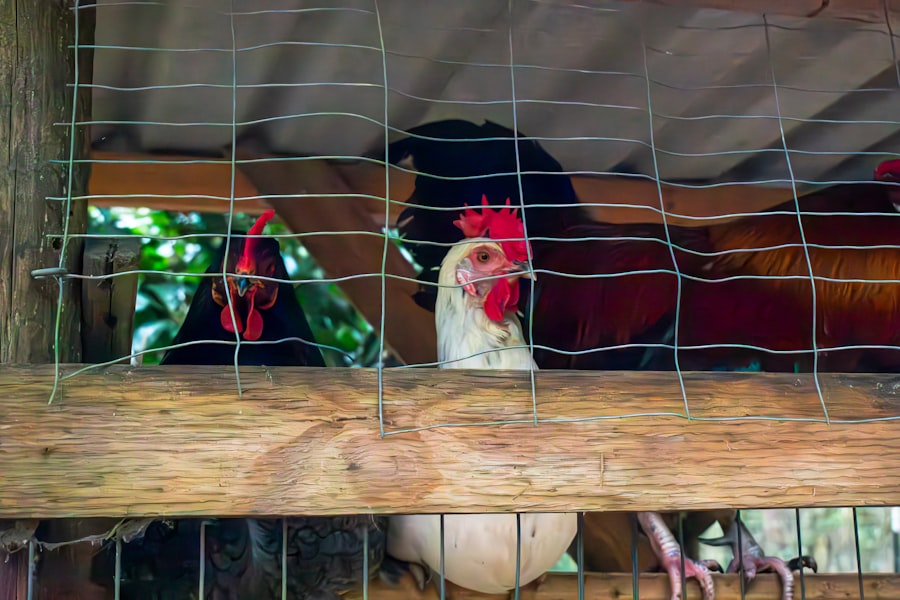Chickens are inherently inquisitive and gregarious animals with a strong drive to search for food. They are easily frightened by abrupt movements or loud sounds. Comprehending these behavioral traits is essential for developing effective methods to keep chickens away from specific areas.
Chickens are also creatures of routine; once they discover a food source or a comfortable roosting spot, they will consistently return to it. This habit underscores the importance of addressing any unwanted behavior promptly to prevent it from becoming established. Within a flock, chickens maintain a strict social hierarchy, often following the lead of dominant individuals.
Consequently, if one chicken finds a way to access a restricted area, others are likely to imitate this behavior. Furthermore, chickens possess acute olfactory and gustatory senses, making them attracted to particular scents and tastes. A thorough understanding of these natural behaviors is crucial for devising effective strategies to deter chickens from undesired locations.
Table of Contents
- 1 Creating Physical Barriers
- 2 Using Natural Deterrents
- 3 Implementing Scare Tactics
- 4 Providing Alternative Sources of Food
- 5 Training and Supervising the Chickens
- 6 Seeking Professional Help
- 7 FAQs
- 7.1 What are some natural ways to keep chickens away from a vegetable garden?
- 7.2 Are there any commercial products available to keep chickens away from a vegetable garden?
- 7.3 Can I train my chickens to stay away from my vegetable garden?
- 7.4 What are the potential risks of allowing chickens to roam freely in a vegetable garden?
- 7.5 Are there any legal restrictions on keeping chickens away from a vegetable garden?
Key Takeaways
- Chickens are naturally curious and will explore their surroundings, including areas where they are not supposed to be.
- Physical barriers such as fences and netting can effectively keep chickens out of certain areas.
- Natural deterrents like citrus peels, garlic, and hot pepper can be used to discourage chickens from entering specific areas.
- Scare tactics such as motion-activated sprinklers or noise-making devices can startle chickens and keep them away from unwanted areas.
- Providing alternative sources of food and entertainment can help redirect the chickens’ attention away from restricted areas.
Creating Physical Barriers
Keeping Chickens Out of Certain Areas
Fences and Netting
One effective way to keep chickens out of certain areas is by creating physical barriers. This can include installing fences or netting around the perimeter of the area you want to protect. The fence should be tall enough to prevent the chickens from flying over it, and the netting should be strong enough to withstand their attempts to peck through it.
Chicken Wire and Hardware Cloth
Another option is to use chicken wire or hardware cloth to create a barrier that is difficult for the chickens to penetrate.
Alternative Barriers
In addition to fences and netting, you can also use other physical barriers such as motion-activated sprinklers or barriers made from materials that chickens find unpleasant to walk on, such as gravel or rough stones. These barriers can be effective in deterring chickens from accessing certain areas, as they create an obstacle that the chickens are unwilling or unable to overcome.
Using Natural Deterrents

In addition to physical barriers, there are also natural deterrents that can be used to keep chickens away from certain areas. One option is to plant certain types of vegetation that chickens find unappealing, such as prickly bushes or strong-smelling herbs. These plants can create a natural barrier that deters the chickens from entering the area.
Another natural deterrent is the use of predator decoys, such as fake owls or hawks. Chickens are naturally wary of predators, so the presence of these decoys can make them hesitant to enter a certain area. Additionally, you can use natural scents that chickens find unpleasant, such as citrus or vinegar, to discourage them from entering certain areas.
Implementing Scare Tactics
Scare tactics can be an effective way to keep chickens away from certain areas. One option is to use noise-making devices, such as wind chimes or bells, to startle the chickens when they approach the area. Another option is to use visual deterrents, such as shiny objects or reflective surfaces, that create a sense of unease for the chickens.
You can also use motion-activated devices, such as lights or sound machines, to startle the chickens when they approach the area. These devices can be effective in deterring the chickens from entering certain areas, as they create a sense of unpredictability and fear for the chickens.
Providing Alternative Sources of Food
One way to keep chickens away from certain areas is by providing them with alternative sources of food. If the chickens are entering a certain area in search of food, providing them with a consistent and plentiful source of food in another location can help deter them from entering the forbidden area. You can also use feeders that release small amounts of food at regular intervals throughout the day, which can help keep the chickens occupied and less likely to seek out other sources of food.
Additionally, you can scatter food in areas where you want the chickens to spend their time, such as in their coop or run, to encourage them to stay in those areas rather than venturing into forbidden territory.
Training and Supervising the Chickens

Establishing Leadership and Influence
Spending quality time with your chickens and establishing yourself as the leader of their flock can be an effective way to keep them away from certain areas. By doing so, you can influence their behavior and discourage them from entering forbidden zones.
Positive Reinforcement Techniques
You can also use positive reinforcement techniques to encourage your chickens to behave in a more desirable way. For instance, rewarding them with treats when they stay in designated areas can be a great motivator.
Supervising Outdoor Activities
Supervising your chickens when they are outside can help prevent them from accessing forbidden areas. By keeping a close eye on them, you can intervene and redirect their behavior when necessary, ensuring they stay safe and out of trouble.
Seeking Professional Help
If all else fails, it may be necessary to seek professional help in addressing the issue of chickens entering forbidden areas. A professional animal behaviorist or poultry expert can provide valuable insight and guidance on how to effectively deter the chickens from accessing certain areas. Additionally, a professional may be able to offer alternative solutions or strategies that have not been considered, based on their expertise and experience working with chickens.
Seeking professional help can provide peace of mind and assurance that the issue will be addressed in a humane and effective manner. In conclusion, there are several strategies that can be used to keep chickens away from certain areas. By understanding their behavior and using a combination of physical barriers, natural deterrents, scare tactics, alternative food sources, training, and professional help when necessary, it is possible to effectively deter chickens from accessing forbidden areas while ensuring their well-being and safety.
If you’re looking for more tips on keeping chickens away from your vegetable garden, you might want to check out this article on how to insulate a chicken coop. Insulating your chicken coop can help keep your chickens comfortable and content, which may reduce their desire to venture into your garden.
FAQs
What are some natural ways to keep chickens away from a vegetable garden?
Some natural ways to keep chickens away from a vegetable garden include using physical barriers such as fences or netting, planting deterrent plants like marigolds or garlic, and using natural repellents like citrus peels or vinegar.
Are there any commercial products available to keep chickens away from a vegetable garden?
Yes, there are commercial products available such as chicken repellent sprays or granules that can be used to deter chickens from entering a vegetable garden.
Can I train my chickens to stay away from my vegetable garden?
Yes, you can train chickens to stay away from your vegetable garden by using positive reinforcement techniques, such as providing them with alternative areas to forage and rewarding them when they stay away from the garden.
What are the potential risks of allowing chickens to roam freely in a vegetable garden?
Allowing chickens to roam freely in a vegetable garden can result in damage to the plants, soil compaction, and the spread of pests and diseases. Additionally, chickens may consume or trample the vegetables, leading to loss of crops.
Are there any legal restrictions on keeping chickens away from a vegetable garden?
There may be local ordinances or regulations that govern the keeping of chickens and their access to gardens. It is important to check with local authorities to ensure compliance with any applicable laws or restrictions.

Meet Walter, the feathered-friend fanatic of Florida! Nestled in the sunshine state, Walter struts through life with his feathered companions, clucking his way to happiness. With a coop that’s fancier than a five-star hotel, he’s the Don Juan of the chicken world. When he’s not teaching his hens to do the cha-cha, you’ll find him in a heated debate with his prized rooster, Sir Clucks-a-Lot. Walter’s poultry passion is no yolk; he’s the sunny-side-up guy you never knew you needed in your flock of friends!


Meet Walter, the feathered-friend fanatic of Florida! Nestled in the sunshine state, Walter struts through life with his feathered companions, clucking his way to happiness. With a coop that’s fancier than a five-star hotel, he’s the Don Juan of the chicken world. When he’s not teaching his hens to do the cha-cha, you’ll find him in a heated debate with his prized rooster, Sir Clucks-a-Lot. Walter’s poultry passion is no yolk; he’s the sunny-side-up guy you never knew you needed in your flock of friends!







